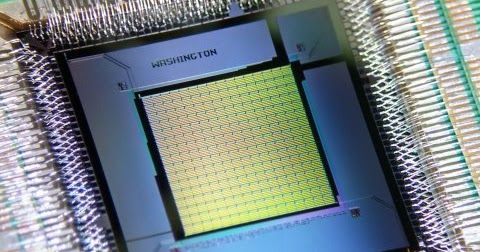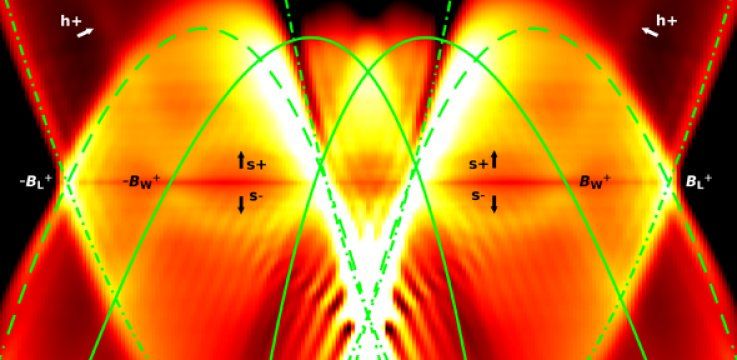Page 10850
Sep 20, 2016
D-Wave systems next quantum chip will 1000X faster and will revolutionize machine learning
Posted by Klaus Baldauf in categories: computing, quantum physics, robotics/AI
Dwave’s next quantum chip, due in 2017, will be able to handle 2,000 qubits which is double the usable number in the existing D-Wave 2X system chip. It will be capable of solving certain problems 1,000x faster than its predecessor.
The new processor will also support additional features that allow for more efficient calculations.
“From an internal tests, that looks like that’s a really good thing to do. We’ve got some problems we’ve already sped up by a factor of 1,000 by exploiting that capability,” said Williams at the CW TEC conference in Cambridge.
Sep 20, 2016
Quantum teleportation was just achieved over more than 7 km of city fibre
Posted by Dan Kummer in categories: cybercrime/malcode, particle physics, quantum physics
Quantum teleportation just moved out of the lab and into the real world, with two independent teams of scientists successfully sending quantum information across several kilometres of optical fibre networks in Calgary, Canada, and Hefei, China.
The experiments show that not only is quantum teleportation very much real, it’s also feasible technology that could one day help us build unhackable quantum communication systems that stretch across cities and maybe even continents.
Quantum teleportation relies on a strange phenomenon called quantum entanglement. Basically, quantum entanglement means that two particles are inextricably linked, so that measuring the state of one immediately affects the state of the other, no matter how far apart the two are — which led Einstein to call entanglement “spooky action at a distance”.
Continue reading “Quantum teleportation was just achieved over more than 7 km of city fibre” »
Sep 20, 2016
A world without work is coming – it could be utopia or it could be hell
Posted by Dan Kummer in categories: employment, robotics/AI
Robots will eventually do all our jobs, but we need to start planning to avert social collapse.
Sep 20, 2016
The AI of Tomorrow: Ameila’s Like Siri, But With A Doctorate in Psychology
Posted by Elmar Arunov in category: robotics/AI

The London Borough of Enfield has employed AI Amelia to handle some customer service aspects. The program will guide customers through the site while learning and even picking up on emotions.
The London borough of Enfield has enlisted artificial intelligence Amelia to take on customer service tasks for its residents starting late this year.
Continue reading “The AI of Tomorrow: Ameila’s Like Siri, But With A Doctorate in Psychology” »
Sep 19, 2016
ISARA Corporation Readies Security Measures for the Quantum Age
Posted by Karen Hurst in categories: computing, encryption, internet, quantum physics, security
Wireless security and internet standards experts release a complete quantum resistant toolkit for commercial use.
TORONTO, Sept. 19, 2016 /CNW/ — 4TH ETSI/IQC Workshop on Quantum-Safe Cryptography – ISARA Corporation today announced the availability of its ISARA Quantum Resistant (IQR) Toolkit. The toolkit helps software and hardware solution providers build robust commercial products that protect vulnerable infrastructure against the threat quantum computing already poses to widely-used security standards.
Similar to the Y2K crisis, the technology industry is facing a ‘Y2Q’ (years to quantum) challenge that has a limited timeline and requires significant work to ensure systems and information are properly protected. The massive processing power of quantum computers is such that, without integrating quantum resistant security solutions, all security that depends on existing standards is vulnerable.
Sep 19, 2016
Quantum effects observed in ‘one-dimensional’ wires
Posted by Karen Hurst in categories: computing, particle physics, quantum physics
Researchers have observed quantum effects in electrons by squeezing them into one-dimensional ‘quantum wires’ and observing the interactions between them. The results could be used to aid in the development of quantum technologies, including quantum computing.
Scientists have controlled electrons by packing them so tightly that they start to display quantum effects, using an extension of the technology currently used to make computer processors. The technique, reported in the journal Nature Communications, has uncovered properties of quantum matter that could pave a way to new quantum technologies.
The ability to control electrons in this way may lay the groundwork for many technological advances, including quantum computers that can solve problems fundamentally intractable by modern electronics. Before such technologies become practical however, researchers need to better understand quantum, or wave-like, particles, and more importantly, the interactions between them.
Sep 19, 2016
Researchers address the importance of measurement in synthetic biology
Posted by Karen Hurst in categories: bioengineering, biological, government, sustainability
Dr Michael Adeogun and Dr Max Ryadnov from the National Physical Laboratory (NPL) have written an expert view for Bio-Based World News on the importance of measurement science in synthetic biology, highlighting the vital work that NPL has already undertaken in this field.
Synthetic biology is a growing field which seeks to develop solutions to major global challenges, such as the generation of sustainable and affordable materials and chemicals, and the use of bio-engineered organisms as products. The UK aims to achieve a £10bn market in synthetic biology by 2030.
Since the publication of the government-commissioned Synthetic Biology Roadmap in 2012, the UK has become the second largest investor in synthetic biology, having developed a national network of research centres, doctoral training programmes and knowledge facilities to drive growth in the commercial sector.
Sep 19, 2016
How Fungus And Synthetic Biology Could Save Astronauts On Mars
Posted by Karen Hurst in categories: bioengineering, biotech/medical, food, space travel
Clay Wang brought his kids to the California Space Center a few years ago to show them the Space Shuttle. But as he looked up at Endeavour and pondered human space exploration, the pharmacologist wondered, “What if a crew runs out of medicine halfway to Mars?”
A lot of things can go wrong during a three-year mission to Mars, and there’s only so much medicine you can pack. “For food you can predict exactly how much the astronauts will need to eat,” says Wang. “Medicine you can’t predict.”
What if they develop a sudden need for a drug that wasn’t packed? Compounding the problem is the fact that the space environment seems to make many drugs lose potency and degrade more quickly compared to drugs on Earth.
Sep 19, 2016
DARPA and the JASON Scientists – The Pentagon’s Maladaptive Brain | Nathaniel Mauka – Waking Times
Posted by Karen Hurst in categories: business, military, neuroscience
Nathaniel Mauka, Staff Writer Waking Times
An uncensored look into DARPA, the US government’s secretive agency, reveals exactly how the brain of the military industrial complex operates. Utilizing the super-scientific intellects of men, the agency may have stumbled upon the ultimate code to utterly control the human race, making all other DoD achievements pale in comparison.
DARPA’s arms reach far and wide – touching universities, small businesses, the public, of course, and also the established media. Despite its collaborative success, the brain running the show is acutely flawed, for its aim is not to protect and serve, but to control.















